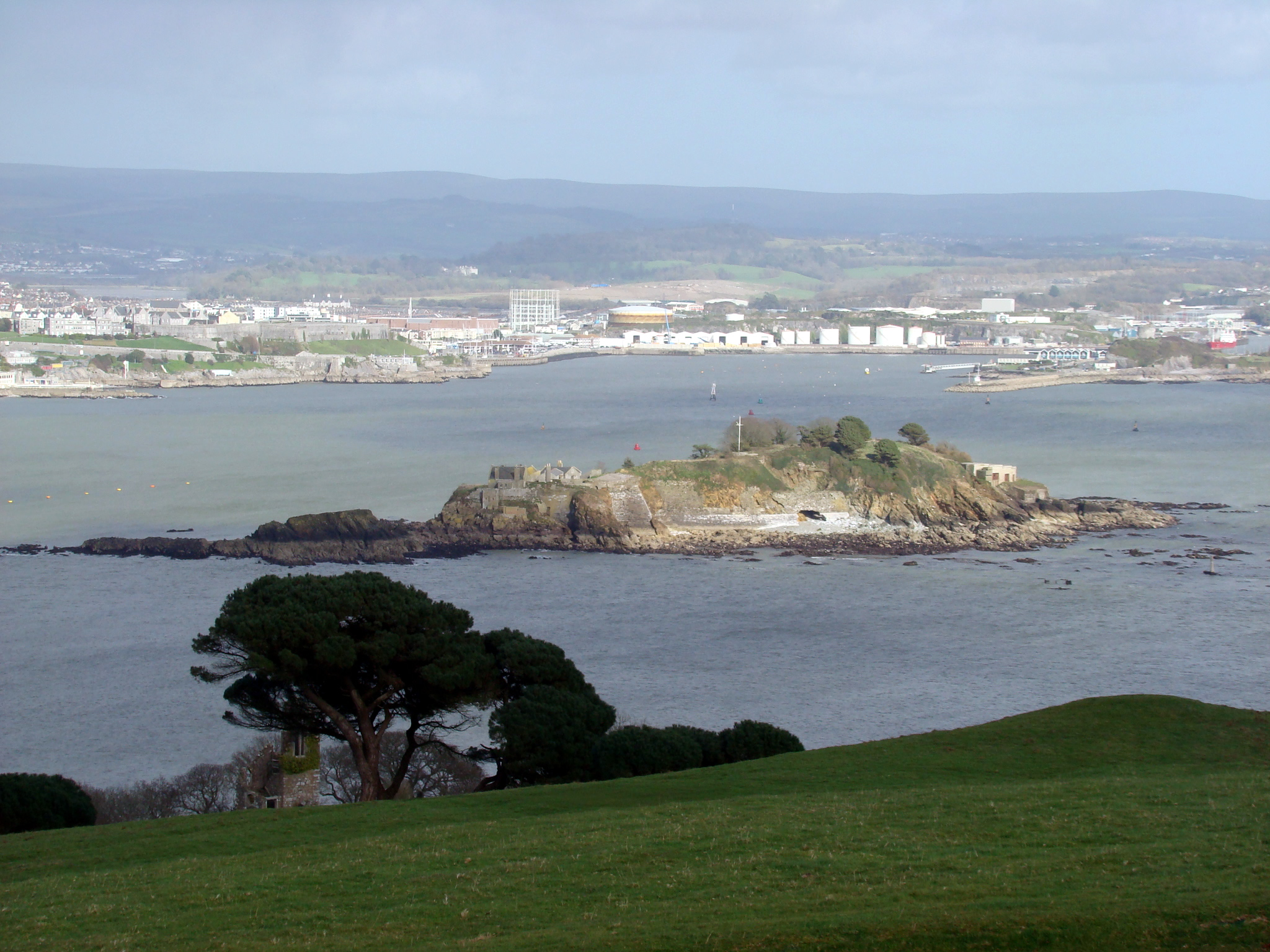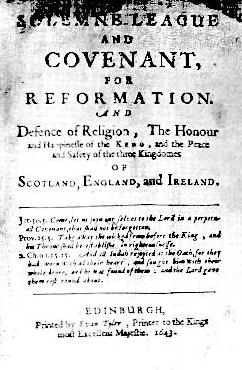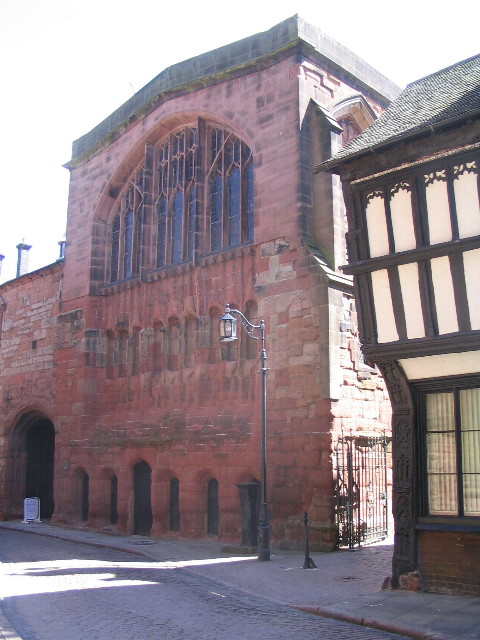|
George Hughes (clergyman)
George Hughes (1603–1667) was an English Puritan priest and writer. Life Born in Southwark, he was sent to Corpus Christi College, Oxford at the beginning of 1619. He was admitted B.A. on 19 February 1623, and proceeded M.A. on 23 June 1625 as a Fellow of Pembroke College. About 1628 he was ordained, and, after serving curacies in and near Oxford, he was chosen in 1631 lecturer at All Hallows, Bread Street, London, where he was popular as a preacher. He commenced B.D. on 10 July 1633. For his refusal to comply with the rubrics he was suspended by William Laud, and would have emigrated to America had he not been dissuaded by John Dod, on whose recommendation he was appointed chaplain to Robert Greville, 2nd Baron Brooke at Warwick Castle. During his residence there he married a Coventry lady. The mother of John Maynard persuaded Francis Russell, 4th Earl of Bedford to obtain for him the vicarage of St Eustachius' Church, Tavistock in Devon, and the earl also made him his chap ... [...More Info...] [...Related Items...] OR: [Wikipedia] [Google] [Baidu] |
George Hughes (1603–1667)
George Hughes may refer to: *George Hughes (American football) (1925–2009), NFL player *George Hughes (cricketer) (1821–1872), English cricketer and the basis for the literary character Tom Brown *George Hughes (engineer) (1865–1945), British locomotive engineer *George Hughes (ice hockey) (born 1988), American professional ice hockey defenceman *George Hughes (priest) (1603–1667), English Puritan priest and writer *George Hughes (rugby) (1870–1947), rugby union footballer of the 1890s for England, and Barrow *George Hughes (1889–1930), African American lynched in Sherman, Texas, see lynching of George Hughes *George E. Hughes (1853–1937), merchant and political figure in Prince Edward Island, Canada *George Edward Hughes (1918–1994), professor of philosophy at the Victoria University of Wellington *George O. Hughes (born 1962), Ghanaian-born American artist *George Wurtz Hughes (1806–1870), U.S. congressman from Maryland *Pat Hughes (tennis) (George Patrick Hughes, ... [...More Info...] [...Related Items...] OR: [Wikipedia] [Google] [Baidu] |
Exeter
Exeter () is a city in Devon, South West England. It is situated on the River Exe, approximately northeast of Plymouth and southwest of Bristol. In Roman Britain, Exeter was established as the base of Legio II Augusta under the personal command of Vespasian. Exeter became a religious centre in the Middle Ages. Exeter Cathedral, founded in the mid 11th century, became Anglican in the 16th-century English Reformation. Exeter became an affluent centre for the wool trade, although by the First World War the city was in decline. After the Second World War, much of the city centre was rebuilt and is now a centre for education, business and tourism in Devon and Cornwall. It is home to two of the constituent campuses of the University of Exeter: Streatham and St Luke's. The administrative area of Exeter has the status of a non-metropolitan district under the administration of the County Council. It is the county town of Devon and home to the headquarters of Devon County Council. A p ... [...More Info...] [...Related Items...] OR: [Wikipedia] [Google] [Baidu] |
1603 Births
Sixteen or 16 may refer to: *16 (number), the natural number following 15 and preceding 17 *one of the years 16 BC, AD 16, 1916, 2016 Films * '' Pathinaaru'' or ''Sixteen'', a 2010 Tamil film * ''Sixteen'' (1943 film), a 1943 Argentine film directed by Carlos Hugo Christensen * ''Sixteen'' (2013 Indian film), a 2013 Hindi film * ''Sixteen'' (2013 British film), a 2013 British film by director Rob Brown Music *The Sixteen, an English choir * 16 (band), a sludge metal band * Sixteen (Polish band), a Polish band Albums * ''16'' (Robin album), a 2014 album by Robin * 16 (Madhouse album), a 1987 album by Madhouse * ''Sixteen'' (album), a 1983 album by Stacy Lattisaw *''Sixteen'' , a 2005 album by Shook Ones * ''16'', a 2020 album by Wejdene Songs * "16" (Sneaky Sound System song), 2009 * "Sixteen" (Thomas Rhett song), 2017 * "Sixteen" (Ellie Goulding song), 2019 *"16", by Craig David from ''Following My Intuition'', 2016 *"16", by Green Day from ''39/Smooth'', 1990 *"16", ... [...More Info...] [...Related Items...] OR: [Wikipedia] [Google] [Baidu] |
John Sergeant (priest)
John Sergeant (1621–1707 or 1710) was an English Roman Catholic priest, controversialist and theologian. Life He was a son of William Sergeant, a yeoman in Barrow-upon-Humber, Lincolnshire, and was admitted in 1639 as a sub-sizar at St John's College, Cambridge, graduating in 1643. On the recommendation of William Beale he was appointed secretary to Thomas Morton, the Anglican Bishop of Durham, time he spent on transcriptions of the Church Fathers. A year or so later, he converted to Catholicism as result of his studies. He subsequently moved to the English College, Lisbon. He studied theology and in 1650 was ordained as a Catholic priest. He subsequently taught at the college until 1652, when he became procurator and prefect of studies. From 1653 to 1654, he worked as a priest in England before returning to Lisbon where he resumed his earlier work and taught philosophy. In 1655 he was elected canon and appointed as secretary. For the next twenty years he was actively enga ... [...More Info...] [...Related Items...] OR: [Wikipedia] [Google] [Baidu] |
Obadiah Hughes
Obadiah Hughes (1695–1751) was an English Presbyterian minister. Life Education He was the son of George Hughes (died in November 1719), minister at Canterbury, and was born in 1695. His father was grandson of George Hughes (priest), George Hughes, and son of Obadiah Hughes (died 24 January 1704, aged 64), who was ejected in 1662 from a studentship at Christ Church, Oxford, before taking his degree, received presbyterian ordination on 9 March 1670 at Plymouth, and ministered from April 1674 in London, and afterwards at Enfield. Obadiah Hughes the younger was educated by his father, by the dissenting tutor John Jennings (tutor), John Jennings at Kibworth, and then at Aberdeen. In 1728 Kings College, Aberdeen, sent him the diploma of Doctor of Divinity, D.D. Having acted for some time as a domestic chaplain, he was ordained on 11 January 1721 at the Old Jewry, being then assistant to Joshua Oldfield, at Maid Lane, Southwark. Career Though a non-subscriber at Salters' Hall contro ... [...More Info...] [...Related Items...] OR: [Wikipedia] [Google] [Baidu] |
John Howe (Puritan)
John Howe (17 May 1630 – 2 April 1705) was an English Puritan theologian. He served briefly as chaplain to Oliver Cromwell. Life Howe was born at Loughborough. At the age of five he went to Ireland with his father, who had been ejected from his living by William Laud, but returned to England in 1641 and settled with his father in Lancaster. He studied at Christ's College, Cambridge, and at Magdalen College, Oxford (B.A., 1650; M.A., 1652), where for a time he was fellow and college chaplain. At Cambridge he came under the influence of Ralph Cudworth and Henry More, from whom he probably received the Platonic tinge that marks his writings. About 1654 he was appointed to the perpetual curacy of Great Torrington, Devon. In this place, according to his own statement, he was engaged in the pulpit on fast days from nine to four, with a recess of fifteen minutes, during which the people sang. While on a visit to London in 1656 Oliver Cromwell prevailed upon him to preach a ... [...More Info...] [...Related Items...] OR: [Wikipedia] [Google] [Baidu] |
Drake's Island
Drake's Island is a island lying in Plymouth Sound, the stretch of water south of the city of Plymouth, Devon. The rocks which make up the island are volcanic tuff and lava, together with marine limestone of the Devonian period. For more than 400 years the island was fortified. Early history The first recorded name for the island was in 1135, when it was referred to as St Michael's after the chapel erected on it. At some later date the chapel was rededicated to St Nicholas and the island adopted the same name. From the latter part of the 16th century the island was occasionally referred to as Drake's Island after Sir Francis Drake, the English privateer who used Plymouth as his home port. Even well into the 19th century, maps and other references continued to refer to the island as St Nicholas's Island and it is only in about the last 100 years that this name has slipped into disuse and the name Drake's Island has been adopted. It was from Plymouth that Drake sailed in 15 ... [...More Info...] [...Related Items...] OR: [Wikipedia] [Google] [Baidu] |
Solemn League And Covenant
The Solemn League and Covenant was an agreement between the Scottish Covenanters and the leaders of the English Parliamentarians in 1643 during the First English Civil War, a theatre of conflict in the Wars of the Three Kingdoms. On 17 August 1643, the Church of Scotland (the Kirk) accepted it and on 25 September 1643 so did the English Parliament and the Westminster Assembly. English Parliament (First Civil War) At the time, the Protestant leaders of the English Parliament were in conflict with King Charles I. Fearing Irish Catholic troops could join the Royalist army, Parliament requested the aid of the Scots. The Presbyterian Covenanters promised their aid, on condition that the Scottish system of church government was adopted in England. This was acceptable to the majority of the English Long Parliament, as many MPs were Presbyterians, while others preferred allying with the Scots to losing the Civil War. After some haggling a document called "'' The Solemn League and Co ... [...More Info...] [...Related Items...] OR: [Wikipedia] [Google] [Baidu] |
Richard Baxter
Richard Baxter (12 November 1615 – 8 December 1691) was an English Puritan church leader, poet, hymnodist, theologian, and controversialist. Dean Stanley called him "the chief of English Protestant Schoolmen". After some false starts, he made his reputation by his ministry at Kidderminster in Worcestershire, and at around the same time began a long and prolific career as theological writer. After the Restoration he refused preferment, while retaining a non-separatist Presbyterian approach, and became one of the most influential leaders of the Nonconformists, spending time in prison. His views on justification and sanctification are somewhat controversial and unconventional within the Calvinist tradition because his teachings seem, to some, to undermine salvation by faith, in that he emphasizes the necessity of repentance and faithfulness. Early life and education Baxter was born at Rowton, Shropshire, at the house of his maternal grandfather (probably on 12 November 1615 ... [...More Info...] [...Related Items...] OR: [Wikipedia] [Google] [Baidu] |
Plymouth
Plymouth () is a port city and unitary authority in South West England. It is located on the south coast of Devon, approximately south-west of Exeter and south-west of London. It is bordered by Cornwall to the west and south-west. Plymouth's early history extends to the Bronze Age when a first settlement emerged at Mount Batten. This settlement continued as a trading post for the Roman Empire, until it was surpassed by the more prosperous village of Sutton founded in the ninth century, now called Plymouth. In 1588, an English fleet based in Plymouth intercepted and defeated the Spanish Armada. In 1620, the Pilgrim Fathers departed Plymouth for the New World and established Plymouth Colony, the second English settlement in what is now the United States of America. During the English Civil War, the town was held by the Roundhead, Parliamentarians and was besieged between 1642 and 1646. Throughout the Industrial Revolution, Plymouth grew as a commercial shipping port, handling ... [...More Info...] [...Related Items...] OR: [Wikipedia] [Google] [Baidu] |
Coventry
Coventry ( or ) is a City status in the United Kingdom, city in the West Midlands (county), West Midlands, England. It is on the River Sherbourne. Coventry has been a large settlement for centuries, although it was not founded and given its city status until the Middle Ages. The city is governed by Coventry City Council. Historic counties of England, Formerly part of Warwickshire until 1451, Coventry had a population of 345,328 at the 2021 census, making it the tenth largest city in England and the 12th largest in the United Kingdom. It is the second largest city in the West Midlands (region), West Midlands region, after Birmingham, from which it is separated by an area of Green belt (United Kingdom), green belt known as the Meriden Gap, and the third largest in the wider Midlands after Birmingham and Leicester. The city is part of a larger conurbation known as the Coventry and Bedworth Urban Area, which in 2021 had a population of 389,603. Coventry is east-south-east of ... [...More Info...] [...Related Items...] OR: [Wikipedia] [Google] [Baidu] |

.jpg)




